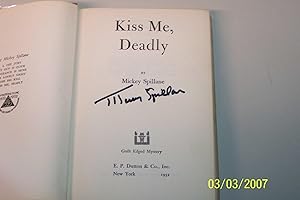



He simply puts Hammer on display, without flourishes to make us love him. Mike Hammer perfectly represented his creator, a racist and misogynist, an unreflective, smug man who appealed to a sizeable portion of the Greatest Generation’s depleted sense of self, as the Organization Man defined a new way of life for the postwar wage slave.Īldrich isn’t in love with Spillane’s creation. In rubbish like One Lonely Night, Hammer laughs out loud as he machine-guns a gaggle of Commies. Hammer is the creation of Mickey Spillane, whose vile pulp novels captured an especially vicious tone of the Cold War and postwar male culture. He is a shambling, sadistic thug, a degraded version of the men who went down mean streets but were not themselves mean. As if he foresees his unstable heirs, Mike Hammer (Ralph Meeker), the nominal hero of Aldrich’s film, is an especially obnoxious incarnation of the tough guy, a ruthless, unsavory version of masculinity that sees itself threatened and on the verge of extinction. But if so, it is also a preamble for a new breed of neurotic male heroes who dominated the color noirs of the following decades, like Lee Marvin’s disoriented ex-con trying to find his elusive payoff in John Boorman’s Point Blank(1967), or Gene Hackman’s hysterical detective, who ends up literally traveling in circles in Arthur Penn’s superb Night Moves (1975). Robert Aldrich’s Kiss Me Deadly is often seen as a capstone to the great period of film noir that began in the early Forties. A Criterion Collection release, distributed by Image Entertainment. Bezzerides cinematography by Ernest Laszlo music composed and conducted by Frank Devol edited by Michael Luciano with Ralph Meeker, Albert Dekker, Paul Stewart, Juano Hernandez, Nick Dennis, Wesley Addy, Maxine Cooper, Cloris Leachman, Gaby Rogers. Produced and directed by Robert Aldrich executive producer Victor Saville screenplay by A.I.


 0 kommentar(er)
0 kommentar(er)
